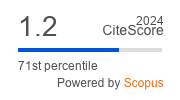Foreign Languages’ Influence on Albanian Police Lexicon
DOI:
https://doi.org/10.29038/eejpl.2020.7.2.hazKeywords:
Albanian, police lexicon, influence, Italian, English, SerbianAbstract
In this study we attempted to thoroughly explain influences of foreign languages on police lexicon in Albanian language, with special focus on the influence of Serbian and English language in Kosovo, as well as the influence of Italian and English language in Albania. Influence of Serbian language only on police lexicon in Kosovo has been created due to historic circumstances of development of police activities under specific conditions. The impact of Serbian language on police lexicon in Albanian language in Kosovo was prevailing for a long period, during which Kosovo was under Serbian rule. This linguistic influence at its highest level in time period between 1970-1990, when Albanian language was used in police activities in Kosovo. In that time period most of the police officers were of the Albanian ethnicity and Kosovo had the status of autonomous province (1974-1990). English influence on police lexicon in Kosovo started in 1999 after liberation of Kosovo. From 1999 to 2008, English was used as the official language together with local languages Albanian and Serbian. This influence has not been limited only to police activities but it has spread widely into all fields of activities in Albanian language in Kosovo. Influence of English language in police lexicon is also evident in Albania, with words like: brifing (alb) – briefing (en), lidership (alb) – leadership (en), staf (alb.)– staff (en), task force (alb) – task force (en), etc. On the other hand Italian language is an influential language in police lexicon only in Albania due to historical, economic and cultural development. As a result, this is manifested by some basic words denoting police activities in Albania derived from Italian, like: komisiariati (alb) – commissariato (it), kavaleri (alb) – cavaleria (it), Policia e Shtetit (alb) - Polizia di Stato (it).
Downloads
References
ASHSH. (1989). Studime për leksikun dhe formimin e fjalëve në gjuhën shqipe III. (1989). [Studies on Lexicon and Word Formation in Albanian Language III]. Tiranë.
ASHSH. (2005). Leksikografia shqipe – trashëgimi dhe perspective [Albanian Lexicography – Heritage and Perspective]. Tiranë.
Haziri, S. (2015). Dallimet terminologjike në mes të Ligjit të Policisë së Kosovës dhe Ligjit të Policisë së Shtetit dhe ca prurje të reja, Albanologji, 6, 279-287.
Haziri, S. (2015), Shkëmbimi gjuhësor gjatë bisedave në Qendrat Komunikuese të Policisë së Kosovës, International Seminar of Albanian Language, 35, 505-516. Retrieved from: https://filologjia.uni-pr.edu/getattachment/Seminari/Seminari---Gjuhesi---Vellimi-1.pdf.aspx
Haziri, S. (2018). Zhvillimi i leksikut policor në gjuhën shqipe në Kosovë, Studime Albanologjike 18, 191-201.
Haziri, S. (2018), Sinonimet në leksikut policor Kosovë-Shqipëri, International Seminar for Albanian Language, Literature and Culture, 37, 345-359. Retrieved from: https://www.ceeol.com/search/article-detail?id=784343
Haziri, S., Munishi, Sh. (2018). Development of Police Terminology in Albanian Language in Kosovo and Albania, Advances in Language and Literary Studies, 9(6), 126. http://dx.doi.org/10.7575/aiac.alls.v.9n.6p.126
Bajçinca, I. (2016). Shqipja standarde dhe probleme rreth saj [Standard Albanian and Its Problems]. Pristina: Institute of Albanology. Association of Albanian Language.
Bogdanović, B. (2002). Dva veka policije u Srbiji [Two Centuries of Police in Serbia]. Belgrade.
Pllana, G. (2017). Formimi i terminologjive teknike shqipe mbi bazën e leksikut të përgjithshëm [Formation of Technical Terminology in Albanian Based on General Lexicon]. QSA. Tirana.
Çipuri, H. (2005). Termat dhe fjalorët terminologjikë ushtarakë në gjuhën shqipe [Terms and Military Terminology Dictionaries in Albanian]. Leksikologjia shqipe, trashëgimi dhe perspektivë. Tirana.
Duro, A. (2001). Terminologjia si system [Terminology as a System]. Tirana.
Islamaj, Sh. (1989). Roli i sinonimisë në pasurimin e gjuhës [Role of Synonymy in Language Enrichment]. ASHSH. Studime për leksikun dhe formimin e fjalëve në gjuhën shqipe III [Studies on Lexicon and Word Formation in Albanian III]. Tirana.
Muceku, A. (2017). Përparësitë e përdorimit të teknikave audio-vizive, të lidhura ngushtësisht me përvetësimin gjuhësor të gjuhëve të huaja në sistemin arsimor shqiptar sipas standardeve evropiane – rasti i italishtes [Advantages of Usage of Audio-Visual Techniques, Closely Linked to Learning of Foreign Languages in Albanian Education System Based on European Standards – Case of Italian], PhD Dissertation. Tirana.
Murati, Q. (2016). Për kulturën gjuhësore shqipe [Albanian Language Culture]. Pristina: Instituti Albanologjik i Prishtinës.
Munishi, Sh. (2015). Shqipja në epokën e globalizimit [Albanian Language in the Globalization Era]. Pristina: ZeroPrint.
Nuhiu, V. (2013). Ndikimi i anglishtes në gjuhën shqipe [English Influence on Albanian Language]. Pristina.
Pasho, H. (2017). Probleme gjuhësore të terminologjisë në gjuhën shqipe [Language Terminology Problems in Albanian]. Tirana: Akademia e Studimeve Albanologjike.
Proko, V. (2012). Leksiku terminologjik i agronomisë në gjuhën shqipe [Agronomy Lexicon in Albanian Language]. QSA. Tirana.
Zmijarević, N. (2007). Policija u Hrvatskoj od 1941 do 2001 [Police in Croatia from 1941 to 2001]. Zagreb: Ministarstvo unutarnjih poslova, Policijska akademija.
Sources
https://pt.wikipedia.org/wiki/Pol%C3%ADcia_do_Estado_(Itália)
Downloads
Published
Issue
Section
License
Copyright (c) 2020 East European Journal of Psycholinguistics

This work is licensed under a Creative Commons Attribution 4.0 International License.












 Creative Commons «Attribution» 4.0
Creative Commons «Attribution» 4.0